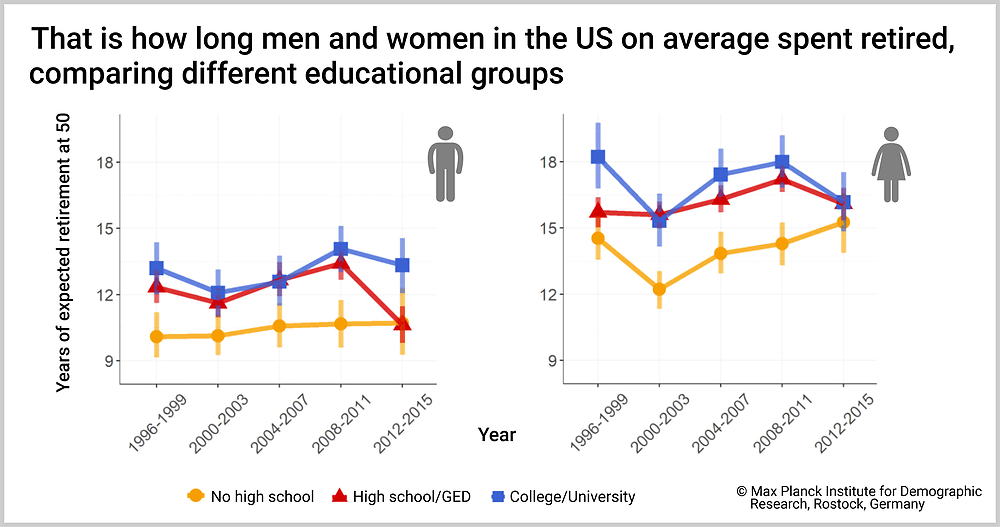December 15, 2022 | Press Release
USA: Less Educated Spend Less Time in Retirement

© iStockphoto.com/CatLane
MPIDR PhD Student Jiaxin Shi and his co-authors modeled later-life work dynamics in the US using longitudinal survey data to show how much the timespan spent in retirement differs between educational groups.
“I was curious about how long people live in retirement and how retirement lifespan differs depending on socioeconomic status”, says Jiaxin Shi, PhD Student at the Max Planck Institute for Demographic Research (MPIDR) in Rostock, Germany about why he started the research related to his recently published paper in the “The Journal of Gerontology: Social Sciences”.
In a country like the United States where many people return to work after initial retirement, it is hard to gauge the total time in retirement by just looking at common mortality statistics such as life expectancy.
Better educated women spend more time in retirement
“We used a sophisticated method to model later-life work dynamics, accounting for individual differences in initial retirement age, probabilities of returning to work after initial retirement, time spent in the resulting re-employment, and age of death”, says Jiaxin Shi. This modeling approach allows the researchers to more accurately estimate the length of time in retirement.
Specifically, the researchers examined how retirement lifespans varied by education and gender in the United States between 1996 and 2015.
They found substantial and consistent inequalities in retirement expectancy by gender and education. For women higher education is associated with higher average retirement lifespan over the time period studied. Among men, the relationship between education and retirement lifespan differed across periods.
Women spent 3.8 years longer in retirement than men, on average. Higher educated men lived 2.6 years longer in retirement than lower educated men, while the same gap for women was 3.0 years.
The researchers show that a significant number of individuals never survive to retirement. In 2012-2015 for Americans at age 50, 16% of men did not survive to retirement, and for women that number is 9%.
The researchers used longitudinal survey data from the Health and Retirement Study, collected by the University of Michigan. This survey has been collecting data on more than 30,000 Americans over 50 since 1992 and tracking the same individuals every other year. This study has the largest data on aging and the most reliable data to study retirement lifespan inequalities in the United States.

© MPIDR
Download Figure (PNG File, 1 MB)
Overall, the researchers show the differences in actual retirement lifespan between educational groups are smaller than expected. This is because lower-educated people tend to retire earlier and have fewer years in re-employment. That is true for men, but not for women.
“Our multistate approach provides an accurate and comprehensive picture of the retirement lifespan of older Americans over the past two decades”, says Jiaxin Shi. He thinks that his findings should be considered in high-level discussions on Social Security. Potential reforms such as raising the eligibility age or cutting benefits may have unexpected implications for different social groups due to their differential impacts on retirement initiation and re-entry dynamics.
Original Publication
Shi, J., Dudel, C., Monden, C., van Raalte, A.: Inequalities in Retirement Lifespan in the United States. The Journals of Gerontology: Series B (2022). DOI: 10.1093/geronb/gbac180
Authors and Affiliations
Jiaxin Shi, Max Planck Institute for Demographic Research, Rostock; Leverhulme Centre for Demographic Science, University of Oxford
Christian Dudel, Max Planck Institute for Demographic Research, Rostock
Christiaan Monden, Leverhulme Centre for Demographic Science, University of Oxford
Alyson van Raalte, Max Planck Institute for Demographic Research, Rostock